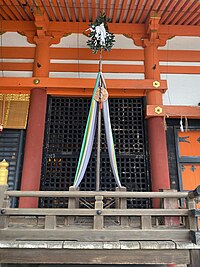Masakaki
Masakaki (Japanese: 真榊) is an object used in Shinto rituals.[1][2][3] It is put on both sides of a table where the event takes place. Masakaki is made with branches of a tree called Sakaki. These branches are attached to the top of colorful cloth banners. The banners are in five colors - green, yellow, red, white, and blue.[1][3]
They were mentioned in the Kojiki and Nihon Shoki as implements used to get Amaterasu to leave the cave.[3]
Special treasures are hung on these branches. On the left side, a sword is hung. On the right side, a mirror and a magatama are hung. The three of them symbolize the Imperial Regalia of Japan.[1] Sometimes, people call the whole setup with a special name, Masakaki-dai. A masakaki offering involves donating two such Masakaki to a shrine or construction ceremony with the three treasures.[2]
The five colors of the cloth stand for the five elements. These elements are wood, fire, earth, metal, and water. At funerals, Masakaki with yellow and white banners is used.[1]
In 2016, Shinzo Abe got controversy for making a Masakaki offering to Yasukuni Shrine.[4] It was incorrectly reported as being an entire tree by some sources.[2] In early 2023, Fumio Kishida ran into a similar controversy.[5][6][7]
See also
[edit]References
[edit]- ^ a b c d D, John (2015-04-05). "The Colours of Shinto (masakaki)". Green Shinto. Retrieved 2023-11-27.
- ^ a b c "What is a Masakaki Offering?". Retrieved 2023-11-27.
- ^ a b c "Sakaki | 國學院大學デジタルミュージアム". 2021-09-21. Archived from the original on 2021-09-21. Retrieved 2023-11-27.
- ^ "Abe sends ritual offering to Yasukuni Shrine". The Japan Times. 2016-10-17. Retrieved 2023-11-30.
- ^ "Japan PM sends offerings to controversial Tokyo shrine". AP News. 2023-04-21. Retrieved 2023-11-27.
- ^ "Kishida donates spring offering to contentious shrine in Tokyo | The Asahi Shimbun: Breaking News, Japan News and Analysis". The Asahi Shimbun. Retrieved 2023-11-27.
- ^ "Japan PM sends offerings to controversial Tokyo shrine". The Independent. 2023-04-21. Retrieved 2023-11-27.
Other websites
[edit]- Image of Masasaki
- Masakaki Archived 2007-03-19 at the Wayback Machine
- Masakaki installation example



